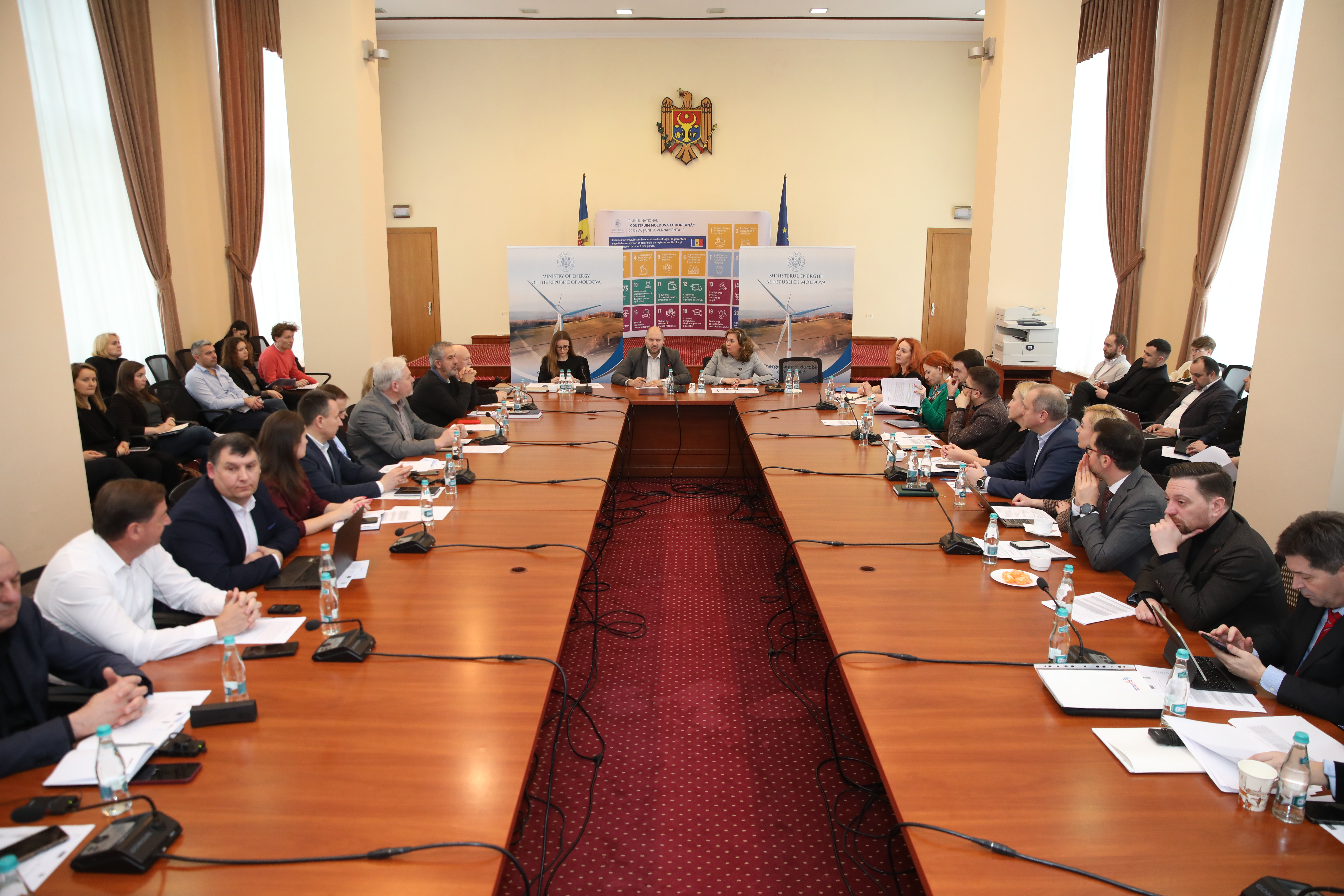The Integrated National Energy and Climate Plan – a roadmap for green economy and energy – was publicly consulted
February 16, 2024

The draft of the Integrated National Energy and Climate Plan (NECP) 2025-2030, a roadmap for achieving the country's decarbonization objectives, was consulted on 16 February 2024. The document was developed by the Ministry of Energy, with the support of the European Union through the "Addressing the impacts of the energy crisis in the Republic of Moldova" programme, implemented by UNDP Moldova.
The NECP sets targets for renewable energy, energy efficiency and greenhouse gas emissions. The plan represents a legal commitment of the Republic of Moldova and only concerns commitments regarding the territory controlled by the constitutional authorities.
All member countries of the European Union and the Energy Community draw up such Plans with the implementation period until 2030, which are reviewed once every five years, in accordance with the Regulation on the governance of the energy union and climate actions (part of the “Clean Energy for all Europeans” Package).
Thus, by 2030, Moldova is committed to having a 27% share of renewable energy in the final energy consumption; to maintain the growth of primary energy consumption at the level of 3000 ktoe and final energy consumption at the level of 2800 ktoe; (2770 ktoe and 2592 ktoe respectively in 2022) to reduce greenhouse gas (GHG) emissions by 68.6% compared to 1990.
“Republic of Moldova has an energy intensity 3.4 times higher than the average in the European Union, which means higher energy costs for a unit of GDP, but also for each family. This document sets the priorities and targets we need to achieve and the policies we need to implement to achieve the goals of having safe, sustainable and accessible energy for all consumers," said Victor Parlicov, Minister of Energy.
“Any economic activity is based on energy consumption, which also generates greenhouse gas emissions. With the process of joining the European Union, our economy will experience growth and it is important to ensure that we decouple this process from energy consumption. In parallel with NEPC, we are working on the climate law and other sectoral documents, which will help to keep global warming within the limits of 1.5 degrees Celsius compared to the pre-industrial period, as we committed to through the Paris Agreement,” said Iordanca Rodica Iordanov, Minister of the Environment.
“Integrated National Energy and Climate Plans set out how EU Member States will contribute to the EU-wide climate and energy targets from 2021 to 2030. Full implementation of these plans would put Europe on track to surpass its current 2030 targets for greenhouse gas emissions reduction and renewable energy. Increased climate ambition has the potential to accelerate the modernization of the EU economy, drive innovation and a fair transition and create long-term, skilled green jobs,” said Solomon Ioannou, Programme Manager within the Delegation of the European Union to the Republic of Moldova.
“The development of the Integrated National Energy and Climate Plan is a milestone towards fulfilling Moldova’s commitments under the Energy Community Treaty, while also charting a course for sustainable development and decarbonization of energy sector. With partners like the European Union, UNDP will shoulder the country’s efforts to put this ambitious plan into practice, so as to accelerate just energy transition, with the aim of achieving by 2030 a 1/3 share of renewables in the total energy mix and improve energy efficiency, all these contributing to reducing greenhouse gas emissions,” said Andrea Cuzyova, Deputy Resident Representative to the Republic of Moldova.
NECP is structured according to the five dimensions of the Energy Union and describes the public policies and investments expected to reach the targets set in each of these dimensions:
- Energy security;
- Internal energy market;
- Energetic efficiency;
- Decarbonization;
- Research, innovation, and competitiveness.
To ensure energy security, NECP provides actions to diversify suppliers; securing and diversifying import routes, but also increasing the degree of use of resources available in the country (biomass, solar, wind).
On the dimension of the internal energy market, the Plan foresees the opening, modernization and liberalization of the internal energy market; creating intraday and day-ahead markets; coupling with European markets by launching the Moldovan Energy Market Operator; creation of cross-border markets for balancing energy systems; managing energy demand and introducing differentiated tariffs.
According to NECP, every year new energy savings of 0.8% of the average annual consumption will be achieved, at least 3% of the public buildings surface owned by central authorities will be rehabilitated annually by investing in their energy efficiency, the energy certification of buildings will be introduced, the Energy Efficiency Fund in Residential Sector will be launched, smart meters for household consumers installed and the smart chargers for electric cars with vehicle-to-grid technology promoted.
On the decarbonization dimension, the document prioritizes replacing firewood with renewables and energy efficient technologies, reaching a quota of 600 MW of wind energy capacities and 200 MW of photovoltaics. Also, the reduction of GHG emissions from 8.75 Mt CO2 to 7.45 Mt CO2 without considering sequestrations.
With a budget of 13 million euros allocated by the European Union, the "Addressing the impacts of the energy crisis in the Republic of Moldova" program, implemented by UNDP, supported the creation of the compensatii.gov.md platform and launched a campaign to replace old household appliances with new ones and energy efficient. The programme finances the installation of photovoltaic panels in households and a few hospitals, as well as the change of central heating systems in several blocks to much more efficient horizontal distribution systems.
In addition, the programme provides support for the transposition of the EU's Third Energy Package into both primary and secondary legislation, as well as the transposition of a number of Directives and Regulations of the Clean Energy for All Europeans package, which address the performance energy efficiency of buildings, renewable energy sources, energy efficiency, good governance and electricity market design.

 Locations
Locations



